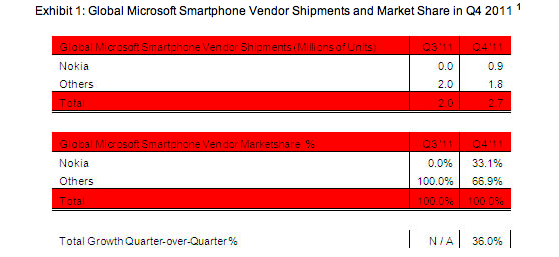Nokia takes largest Windows Phone 7 vendor crown: Shame about the market share

Nokia has become the biggest vendor of Windows Phone 7 devices on the market.
Research firm Strategy Analytics said today that fourth quarter shipments of Windows Phone 7 devices were up by 36 percent compared to the third quarter. It's better, but considering that the shipping figure is still only 2.7 million units in the last quarter, the numbers mean nothing because the market share figure stinks.
Apple sold 37 million iPhones during the same period. Go figure.

Between August and October 2011, the combined power of Samsung and Android kicked off many big names from the top mobile OEMs list, taking a 25.5 percent reach and 46.3 reach respectively.
But Microsoft's Windows Phone 7 platform fared even worse than the BlackBerry, a sinking ship in the mobile space. Symbian, however, remains in the top five. At the last count, Microsoft lost as much share as Symbian did.
Microsoft's mobile reach is still well within the 4--6 percent range. Google has over 45 percent, and Apple has nearly 30 percent. Seeing as Microsoft is the world leader in operating systems, it clearly hasn't nailed the success on the mobile yet.
Nokia taking the crown as the largest Windows Phone 7 vendor is like being the most attractive looking person in an ugly contest. The two companies can produce fantastic products, services and platforms. But putting the two together may in theory work well; the results are not showing a vast amount of success.
But if Nokia was counting on Microsoft to save it from an uncertain doom, favouring its mobile operating system over Symbian which remains in a steady decline, perhaps Nokia should not have put most of its eggs all in one Redmond-based basket.
HTC, which was once the top vendor, was relegated to second place. It's bad news for HTC, but because Microsoft follows the Google pattern of licensing out its operating system to others --- unlike Research in Motion and Apple --- it guarantees a further spread of share and a lack of dependence and lock-in by specific hardware.
Having said that, what we have seen with Android and the massive, exponential growth of market share and user base should not be a benchmark. Google managed something with Android that Microsoft could not do with Windows Phone 7.
The U.S. consumer market is still waiting for the 'good' Windows Phone 7 devices to come out, like the Nokia Lumia 900, slated for March 18th. Until then, perhaps Nokia and Microsoft should take a step back and work out exactly why it does not have the force that Google has.
Because if we know anything, Google knows growth. In social networking, search and the mobile space. Take heed, and emulate success wherever possible.
Image source:
Related: